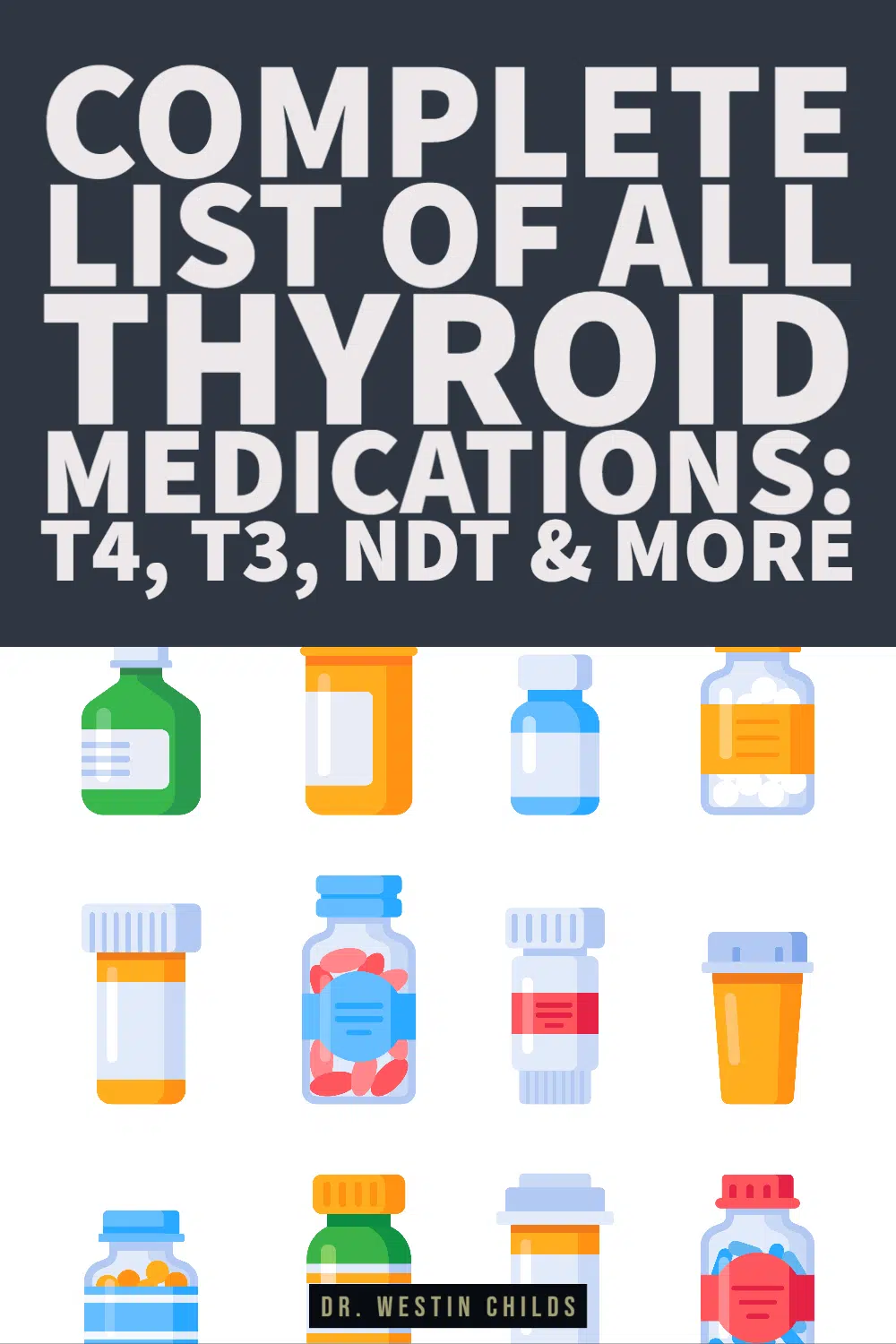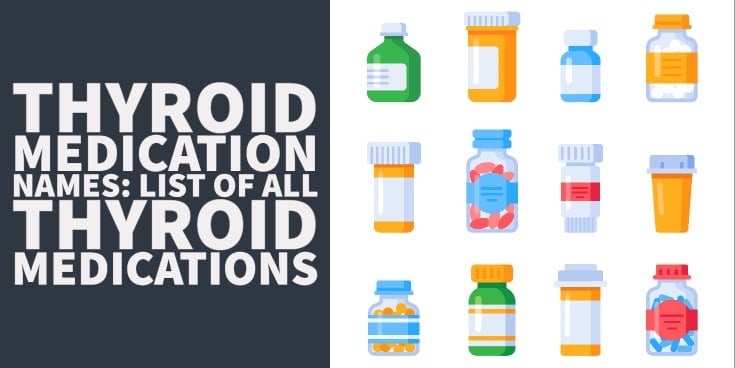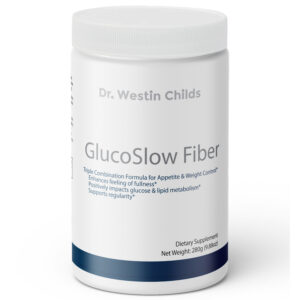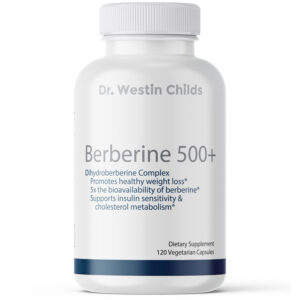This post contains a complete list of thyroid medication names based on the thyroid hormone content of the medication.
The list includes medications with T4 only thyroid hormone, T3 only thyroid hormone, and T4 + T3 thyroid hormone combinations.
If you want to learn more about thyroid hormones, which hormones certain medications have, and how they will affect you, then this article is for you.
List of Thyroid Medications by Thyroid Hormone Content
When it comes to treating hypothyroidism you may be surprised to find out that there are actually many different types and brands to choose from.
Most Doctors and endocrinologists jump straight to Synthroid and levothyroxine (these are the most common) but there are many other brands and types to choose from.
Thyroid medications primarily differ in 2 major areas:
The first has to do with the thyroid hormones that they contain and the second has to do with the fillers or binders that are also found in each medication.
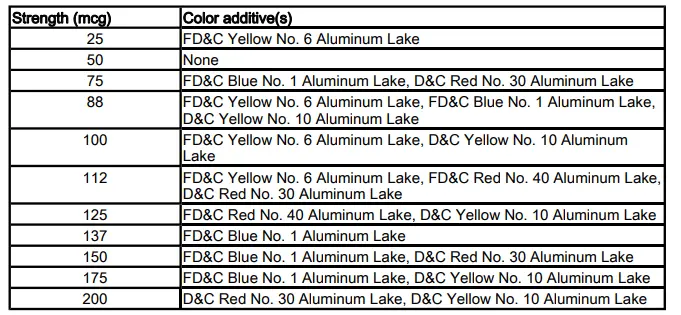
Both of these areas can impact how well you tolerate and how well the medication works in your body which is why it’s important for you to have some idea of what is available.
Let’s briefly discuss these areas and why they are important if you don’t want to wait you can jump straight down to find a list of thyroid medication names below.
The most important area has to do with the thyroid hormone content in each thyroid medication.
There are 2 main thyroid hormones that you should be aware of.
The first is T4 which is the most common thyroid hormone circulating in your body.
This hormone is very stable in your blood, it’s not very active by itself, and it must be converted in order to function.
The second is T3 which is the most powerful thyroid hormone circulating in your body.
This hormone doesn’t last as long as T4 does because it is so active in the bloodstream, but it is the most active and powerful thyroid hormone.
Your thyroid gland produces a steady stream of thyroid hormones right into your bloodstream at about a ratio of 80% T4 and 20% T3 (1).
This ratio is important because it’s what your body is used to producing when it is functioning normally and it’s the ratio that you should try to achieve when using thyroid hormone medication.
With this basic knowledge, we can talk about the different types of thyroid hormone medications.
DOWNLOAD FREE RESOURCES
Foods to Avoid if you Have Thyroid Problems:
I’ve found that these 10 foods cause the most problems for thyroid patients. Learn which foods you should avoid if you have thyroid disease of any type.
The Complete List of Thyroid Lab tests:
The list includes optimal ranges, normal ranges, and the complete list of tests you need to diagnose and manage thyroid disease correctly!
List of T4 Only Thyroid Medication Names

- Synthroid (Brand name)
- Levothyroxine (Generic)
- Tirosint (Brand name – special in that it only has 4 total ingredients)
- Tirosint-Sol
- Levoxyl
- Unithroid
- Euthyrox
- Levo-T
- Levothroid
These medications are the most commonly prescribed of all thyroid medications!
In fact, Synthroid is one of the most commonly prescribed medications in the United States.
These medications are often the first class that doctors go to if you need thyroid medication because they are felt to be the ‘safest’.
It’s not that the other thyroid medications are unsafe but instead that these medications are just incredibly stable and long-lasting in your bloodstream.
This means that if you miss a dose, take too much, or make any mistake in regard to your medication, the consequences are not very high.
The trade-off to this is the fact that these medications are not always powerful enough to get the desired effect in some individuals.
Up to 20% of people taking T4-only thyroid medications may still experience the symptoms of hypothyroidism (2) despite taking a ‘sufficient’ amount of thyroid medication.
This group of people probably suffers from genetic changes which cause an issue in activating the T4 thyroid hormone after it’s been ingested.
If you fit into this category (meaning you still have symptoms of hypothyroidism despite taking thyroid medication) then you may need to take a look at the other medications listed below.
List of NDT (Natural Desiccated Thyroid Hormone) Names
- Armour Thyroid (Brand name)
- NP Thyroid (Generic for Armour Thyroid)
- WP Thyroid (Currently not available)
- Nature-Throid (Currently not available)
- Thyrolar
- Adthyza (New NDT formulation)

There are many other names of Natural Desiccated Thyroid hormone which vary based on your country, but all of these medications share one thing in common:
They are produced from the desiccated glands of animals.
What does that mean?
It means that these medications are created by drying up and crushing the thyroid hormone glands of animals (usually pigs) and then formulated as medications.
They are unique among all types of thyroid medications because they contain much more than just thyroid hormones.
Because they contain the gland of animals they also contain a trace amount of other nutrients, less active thyroid hormones, proteins, and minerals.
These medications are also dosed differently than all other thyroid medications.
They are split up into what is referred to as ‘grains’ of NDT.
Each grain of NDT contains a standardized amount of T4 and T3 (this makes it so you always get the same amount of thyroid hormone regardless of which brand or name you are using).
Each grain of NDT contains 38 micrograms of T4 thyroid hormone and 9 mcg of T3 thyroid hormone (3).
It’s often easier to think about these medications in doses of grains because the milligram dosages of NDT can vary based on the medication type.
For instance:
60mg of Armour thyroid = 1 grain but 65mg of Nature-Throid = 1 grain.
So 60mg of Armour thyroid and 65mg of Nature-Throid both contain 38mcg of T4 and 9 mcg of T3 even though they vary in their mg concentration.
List of T3 Only Thyroid Medication Names
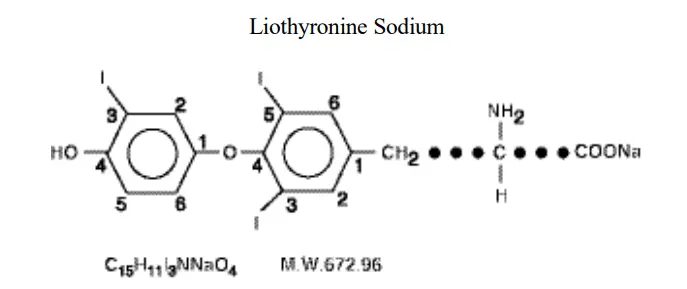
- Cytomel (Brand name)
- Liothyronine (Generic)
- SR T3 (Sustained release T3)
T3-only thyroid medications are not frequently commonly prescribed but they are the strongest type of thyroid hormone medication available.
These medications contain the pure and active thyroid hormone T3 or triiodothyronine.
Doctors tend to shy away from using these medications because they operate under the assumption that the body can activate T4 without any issues.
We’ve already established that this doesn’t occur effectively in at least 20% of the population, but they still aren’t comfortable using them.
Other concerns with T3 medications include the fact that these medications can sometimes cause symptoms such as heart palpitations (4).
Many doctors don’t want to deal with these side effects which can result in patient phone calls late in the evening.
Couple this with the unfamiliarity of using them and we have a recipe for why most doctors just opt to avoid using T3 medications completely.
Unfortunately, this is too bad considering how much help they can be for many patients.
Cytomel and liothyronine are both available from regular pharmacies while SR T3 is only available from compounding pharmacies.
SR T3 is often ideal for patients who experience heart palpitations or anxiety when using the immediate-release versions of SR T3.
When using T3-only thyroid medications you often need a much smaller dose when compared to T4 medications.
Doses range from 5mcg up to 50mcg per day which can be compared to Synthroid doses which generally start at 50mcg and go up to 150mcg per day (or more).
Compounded T4 and T3 Thyroid Medication
This list of medications doesn’t necessarily have a specific name but it’s important for you to realize that your doctor can write a prescription that contains any amount of T4 or T3 using a compounding pharmacy.
A compounding pharmacy is a special type of pharmacy (5) that can create medication combinations that normal pharmacies can’t.
Your doctor can have your medication created using different inactive ingredients, they can change a prescription to be applied to your skin instead of being taken by mouth, and so on.
This is important for your thyroid for several reasons:
The first has to do with the fact that your doctor can individually dose the amount of T4 and T3 based on what your body needs.

NDT (Natural Desiccated Thyroid) comes in a set amount of 38mcg of T4 to 9mcg of T3 in each ‘grain’.
But what if you can’t tolerate the 9mcg of T3? What if you need more or less?
That’s where compounding pharmacies come into play.
Your Doctor can write a prescription that contains 50mcg of T4 and 5mcg of T3.
They can write a prescription that contains 50mcg of T4 and 30mcg of T4 or any combination.
This gives both you and your doctor flexibility to find what works best for your body while reducing the number of capsules/pills that you need to take.
One of the major drawbacks to using this route is that compounding pharmacies are often more expensive than traditional pharmacies.
So your monthly prescription may run upwards of $50 per month compared to the standard $4 – $10 per month that other thyroid medications cost.

Because of the cost, it’s often better to try and find your ideal dose
Natural vs Synthetic – What’s the Difference?
You may have heard that some thyroid medications are felt to be better than others because they are ‘natural’.
What exactly does that mean?
What is the difference between synthetic thyroid hormones and natural thyroid hormones?
The difference comes from how they were created.
The only natural thyroid hormone available is found in NDT or Natural Desiccated Thyroid medications.
These medications are considered natural because they come from nature and they contain animal thyroid hormones.
It just so happens that pig thyroid hormones look exactly like human thyroid hormones but this is not the case with all hormones or animals.
Because these hormones come from an animal, and because they are not created in a laboratory, they are considered natural.
It’s important to note that they do still come from an animal source and not a human source.
Synthetic thyroid hormones are medications that are created in a laboratory and which do not come from humans or animals.
Both natural and synthetic thyroid hormones look identical in chemical structure but they differ in how they are created and where they are obtained.
Some people believe that natural thyroid medications are superior to synthetic medications but I have not found this to be the case.
All Thyroid Medications are Bio-Identical
Another important point worth mentioning is that all thyroid medications are considered to be bio-identical.
What exactly does that mean?
It means that the hormone found inside the medication is an exact replica of what your body would produce normally.
This should be differentiated from other hormones that are synthetic and NOT bio-identical (6).
Synthetic hormones have similar but different chemical structures.
They often behave similarly to what normal hormones would do in the body but they are not the same.
The way that your body breaks them down, the by-products created during this process, and the activation of cellular messengers are not the exact same as bio-identical hormones.
This concept gets more important when we discuss other hormones such as progesterone, testosterone, and estrogen because there are other options available.
But when it comes to thyroid medication you generally don’t have to worry about fake or synthetic medications.
Medication Names Differ by Country
Lastly, it’s important to understand that each country has a different name for these medications.
Even though the name is different, all of the medications will still fall into the same classes above (T3 only, T4 only, or T3 + T4 combinations).
Many people from around the world read this blog (thyroid problems are common everywhere!) so this information is important if you are one of those people.
If you aren’t sure what medication you are currently using or taking all you need to do is ask your pharmacist what the ACTIVE ingredient is in your medication.
If the active ingredient is Thyroxine then you are using a T4 medication.
If the active ingredient is Triiodothyronine then you are using a T3 medication.
Some countries don’t have access to all types of thyroid medications or hormones but all countries should have at least some form of thyroxine or T4-only thyroid medication available.
Some countries, like the United Kingdom, don’t recommend the use of T3 thyroid medications which has made them very difficult to obtain.
Can you get other types of thyroid medications if you live in another country?
The answer is yes, but it may require you to get it from another country and transport it to your country.
There are also online pharmacies that can provide you with medications but the good ones require a prescription from your Doctor.
If you don’t have a specific medication available to you, or if the price is cheaper elsewhere, you may be able to fax over a prescription from your Doctor and have that medication mailed to you directly.
Conclusion
Use this list of thyroid medications to help educate yourself on what is available!
Many doctors opt to use medications such as Synthroid and levothyroxine because they have not received training on how to use other medications.
Just realize that you have many options available to you and it may require some trial and error to find what works best for you!
In my experience, I feel that it is best to try and mimic how your thyroid functions naturally by providing a combination of both T4 and T3.
This may require the use of individual T4 and T3 medications or a medication that contains both such as NDT.
Now I want to hear from you:
Do you have any questions about thyroid medications?
What medication are you currently taking?
Is it working for you? Why or why not?
Leave your questions or comments below!
